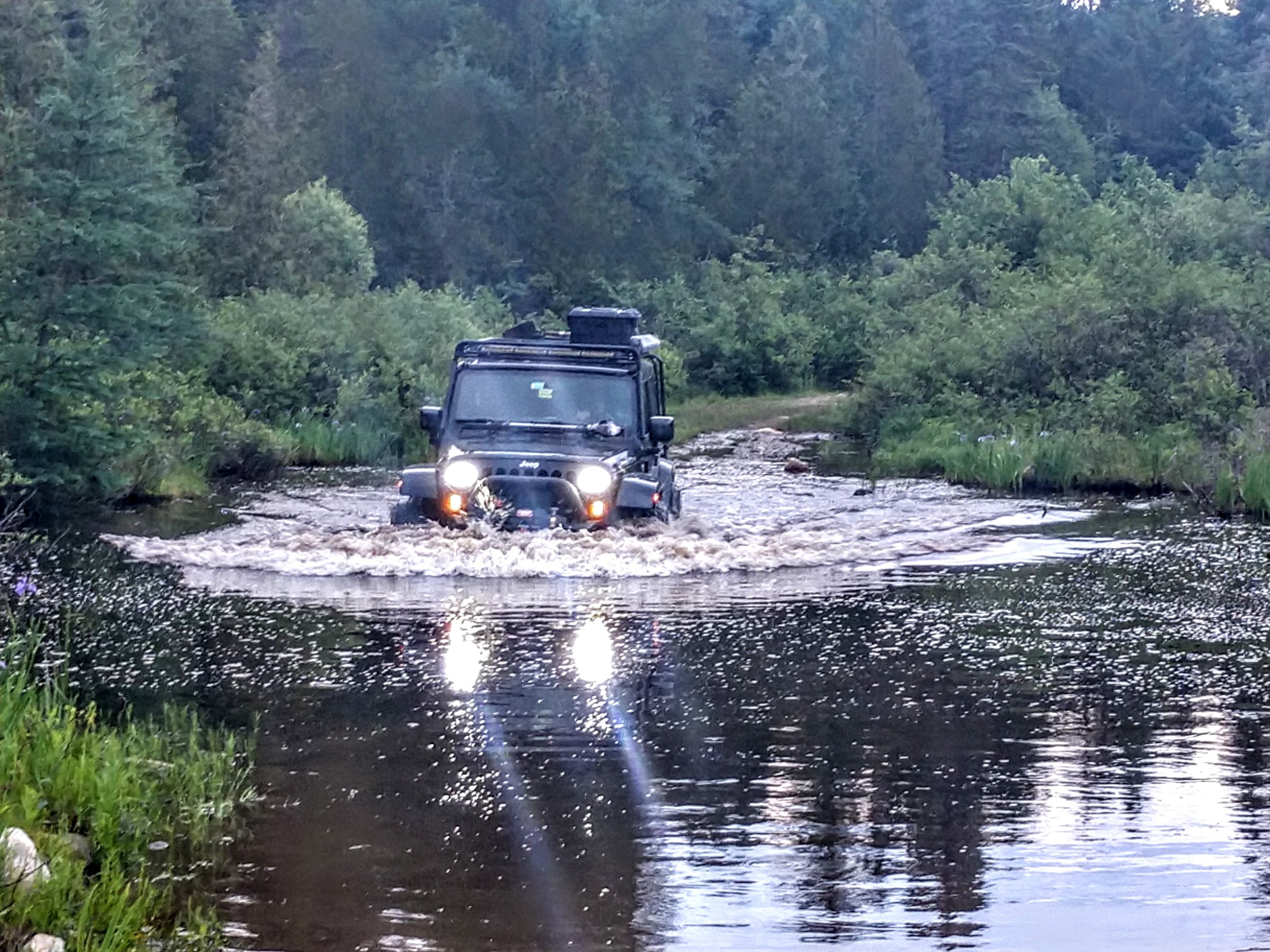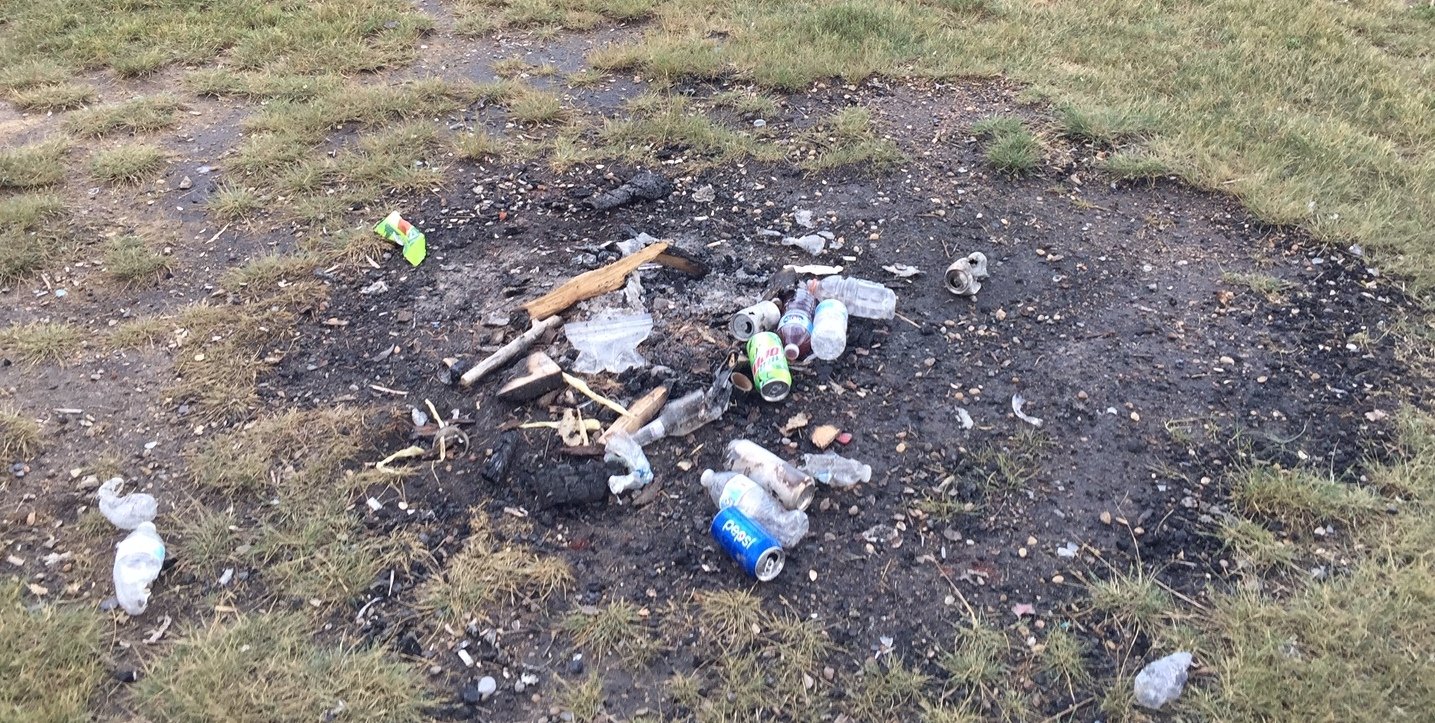Don’t Be an Idiot - Tread Lightly
A few weeks ago we got a comment on one of our posts on Facebook that was chastising us for driving up a river and ruining the natural environment. You might think that this upset us, but on the contrary, we totally agree with the sentiment. If you want to explore the backcountry it’s your obligation to act responsibly and to Tread Lightly, whether you are venturing out on foot or by ATV, Vehicle, or boat. If not then we will all lose out.
The picture in question
My response to the commenter in full was “Hi, this is not a river. It is a flooded trail. We completely agree with you and don't dry up rivers. We stay on marked trails and try to Leave No Trace as best as possible.” It’s true, if you look carefully you can see the trail behind the Jeep. We are also progressing in a controlled manner in order to minimize the impact on the trail. We believe strongly in Leave No Trace and Tread Lightly, and it’s very important to us.
There is a sentiment that is getting more common that we own the land and can treat it as you see fit. We have even recently seen multiple truck commercials depicting a truck driving up a river or just randomly driving off-trail. Why? Way to set a great example.
We love nature and the wild world around us. It soothes and never ceases to amaze us. The more remote the better. While we do hike and plan to take up mountain biking and kayaking, the main way we explore and enjoy the outdoors is in our Jeep, and without access, it all goes away. You can only hike so far. Access is a privilege, not a right, and one that is going away more and more and is at increased risk as time goes on.
Unfortunately, the majority of us suffer because of the actions of the few. Trails are getting chewed up and destroyed. The increased popularity of dirt bikes, ATV’s, and side by sides seem to be only making matters worse. A good deal of the damage seems to be coming from these types of vehicles. I am not saying that all ATV riders are irresponsible, I am only saying that in our experience a higher percentage of ATV owners are more likely to drive recklessly than vehicle-based explorers. But the problems go both ways, ATVs are accessing closed trails as they can more easily maneuver around barriers or fit through the trees, and 4x4s are accessing ATV-only trails that are paid for and maintained by ATV clubs.
While trail damage continues to be an issue, one of the bigger issues is trash. Beer cans are strewn along the trails, trash all over campsites, and people using the woods as their local transfer center, and dumping tires, appliances, and all kinds of trash. Once it reaches a tipping point the private landowners or controlling public bodies close access and everyone loses out. Once lost it is almost impossible to get back.
Trash littered campsite are becoming commonplace
I really don’t understand it. Why do you need to throw your beer cans out on the trail? Do you want to shoot your shotgun off at your campsite? Fine, but why leave a hundred empty shells scattered about? You are willing to take the time and put your old tires in your truck and take them to the woods to throw out, why couldn’t you just take them to the dump? Most people will probably just say hey that’s not me, that’s not what we do. It’s not us either, but unfortunately, if you want to keep going to that campsite you need to do something about it.
The old saying goes something like take only memories, leave only footsteps. But we all really need to take it a step further and leave the place better than we found it. It’s what we always strive to do. Whenever we arrive at a campsite we clean up all the trash before setting up camp, and we pack out all of our trash with us. The same goes for trash we find along the trail.
An ever-increasing issue as of late is human waste. It’s everywhere. We don’t see it as much in the North Maine Woods as you can only camp in designated campsites and each site has its own pit toilet. But those without toilets are littered with human waste.
Campfires are also a big issue. People have started having fires wherever they want, even if there isn’t a fire ring. They burn all manner of items from pallets to random trash. They also feel that fires are a right and don’t always obey fire restrictions. These restrictions are in place for a reason. Large parts of the country have experienced years of droughts and are extremely dry. Massive forest fires are becoming the norm, and it doesn’t take much to get them started. The monster Carr Fire in Northern Cal was started when a flat tire on an RV caused the wheel's rim to scrape against the asphalt, creating sparks that set off the fire. I can’t tell you how many campsites we have arrived at that had fires still smoldering hours after the last person left.
So what do you do? Don’t be an idiot! Stay on marked trails, including in order to go around an obstacle. Drive responsibly, don’t tear up muddy trails, and do donuts. Pack out your trash, and if you come upon trash on the trail or at your campsite pick it up. No pit toilet? Pack it out or dig a hole. Obey fire restrictions and when allowed only have campfires in established fire rings. Douse all fires before leaving your campsite. Take the extra minute to do it right so that the next time you want to go out you still can.
This is the least you can do. Do you really want to help? join one of the many organizations trying to protect our trails while also trying as best as possible in order to ensure access. Organizations like Tread Lightly! and Leave No Trace. Join a trail cleanup project in your area, or better yet host one. It’s all our responsibility until it is too late.
We are Tread Lightly! members, here are their tips for responsible four-wheeling:
QUICK TIPS FOR RESPONSIBLE FOUR WHEELING
Minimize your impact by traveling only in areas open to four-wheel drive vehicles. Learn more about our RIDE ON campaign.
Every true 4WD enthusiast should know the basics of minimizing impact in the great outdoors. Below are some great tips using the TREAD principles.
TRAVEL RESPONSIBLY
Travel responsibly on designated roads, trails or areas.
Travel only in areas open to four-wheel drive vehicles.
For your safety, travel straight up or down hills.
Drive over, not around obstacles to avoid widening the trail.
Straddle ruts, gullies and washouts even if they are wider than your vehicle.
Cross streams only at designated fording points, where the road crosses the stream.
When possible, avoid mud. In soft terrain, go easy on the gas to avoid wheel spin, which can cause rutting.
Don’t turn around on narrow roads, steep terrain or unstable ground. Back up until you find a safe place to turn around.
Stop frequently and scout ahead on foot. To help with traction, balance your load and lower tire pressure to where you see a bulge (typically not less than 20 pounds).
Know where the differential or the lowest point on your vehicle is. This will help in negotiating terrain and prevent vehicle damage resulting in oil and fluid spills on the trail.
Maintain a reasonable distance between vehicles.
Comply with all signs and respect barriers.
Travel with a group of two or more vehicles. Driving solo can leave you vulnerable if you have an accident or breakdown. Designate meeting areas in case of separation.
Choose the appropriate winch for your vehicle size.
Attach towing cable, tree strap, or chain as low as possible to the object being winched. Let the winch do the work; never drive the winch.
When winching always inspect your equipment, use the right winch for the situation, find a good secure anchor and never winch with less than five wraps of wire rope around the drum.
When using a tree as an anchor, use a wide tree strap to avoid damaging the trunk of the tree.
Don’t mix driving with alcohol or drugs.
RESPECT THE RIGHTS OF OTHERS
Respect the rights of others, including private property owners, all recreational trail users, campers and others so they can enjoy their recreational activities undisturbed.
Be considerate of others on the road or trail. Learn the basics of trail etiquette.
Leave gates as you find them. If crossing private property, be sure to ask permission from the landowner(s).
Yield the right of way to those passing you traveling uphill. Yield to mountain bikers, hikers and horses.
When encountering horses on the trail, move to the side of the trail, stop, turn off your engine, remove your helmet and speak—you want the horse to know you are human. Ask the rider the best way to proceed.
Proceed with caution around horses and pack animals. Sudden, unfamiliar activity may spook animals—possibly causing injury to animals, handlers and others on the trail.
Do not idly ride around in camping, picnicking, trailhead or residential areas.
Keep speeds low around crowds and in camping areas.
Keep the noise and dust down.
EDUCATE YOURSELF
Educate yourself prior to your trip by obtaining travel maps and regulations from public agencies, planning for your trip, taking recreation skills classes and knowing how to operate your equipment safely.
Obtain a map, (motor vehicle use map where appropriate) of your destination and determine which areas are open to off-highway vehicles.
Make a realistic plan and stick to it. Always tell someone of your travel plans.
Contact the land manager for area restrictions, closures and permit requirements.
Check the weather forecast before you go. Prepare for the unexpected by packing necessary emergency items.
Buckle up! Seat belts are mandatory. Know your limitations. Watch your time, your fuel and your energy.
Take an off-highway drivers course to learn more about negotiating terrain in a four-wheel drive vehicle.
Make sure your vehicle is mechanically up to task. Be prepared with tools, supplies, spares and a spill kit for trailside repairs.
AVOID SENSITIVE AREAS
Avoid sensitive areas such as meadows, lake shores, wetlands and streams. Stay on designated routes.
Other sensitive habitats to avoid include living desert soils, tundra, and seasonal nesting or breeding areas.
Do not disturb historical, archeological or paleontological sites.
Avoid “spooking” livestock and wildlife you encounter and keep your distance.
Motorized and mechanized vehicles are not allowed in designated Wilderness Areas. (What are Wilderness Areas?)
Pack out what you pack in and carry a trash bag on your vehicle to pick up litter left by others. Respected Access is Open Access
DO YOUR PART
Do your part by modeling appropriate behavior, leaving the area better than you found it, properly disposing of waste, minimizing the use of fire, avoiding the spread of invasive species and restoring degraded areas.
Carry a trash bag on your vehicle and pick up litter left by others.
Pack out what you pack in. Practice minimum impact camping by using established sites, camping 200 feet from water resources and trails.
Observe proper sanitary waste disposal or pack your waste out.
Protect the soundscape by preventing unnecessary noise created by a poorly tuned vehicle or revving your engine.
Before and after a ride, wash your vehicle to reduce the spread of invasive species.
Build a trail community. Get to know other types of recreationists that share your favorite trail.



